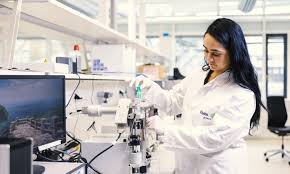
Data centers run 24/7, consuming vast amounts of electricity and water to manage heat and maintain optimal temperatures. With the growing demand for artificial intelligence (AI), high-performance computing, and cryptocurrency mining fueling rapid expansion of data centers worldwide, the need for sustainable and efficient cooling methods has never been greater. Traditionally, most facilities have relied on air- and water-based cooling systems. Chemours’ Liquid Cooling Venture, built on more than nine decades of thermal management expertise, is collaborating with global industry leaders to pioneer innovative and sustainable cooling technologies through its extensive range of data center solutions.
Data center operators are increasingly focused on minimizing their energy and water use to improve sustainability and lower operating costs. Liquid cooling systems, including Chemours’ Opteon two-phase immersion cooling fluid, are helping achieve these goals by significantly cutting water and power consumption, as well as CO₂ emissions, compared to conventional air-cooling setups. This technology can reduce cooling energy requirements by as much as 90%, lower total ownership costs by up to 40%, shrink the physical footprint by nearly 60%, and almost eliminate water usage entirely. Furthermore, Chemours’ liquid cooling solutions promote circularity by enabling the recovery and reuse of heat and fluids—enhancing both efficiency and sustainability outcomes.
Advancing Resource Optimization
To better understand the efficiency and environmental adaptability of various cooling systems, LiquidStack—a liquid cooling technology firm—partnered with Chemours to commission a study by the Syska Hennessy Group. The research evaluated multiple cooling methods, including single-phase direct-to-chip, single-phase immersion, and two-phase immersion cooling, across diverse global climates such as Copenhagen, Ashburn (Virginia), Singapore, and Abu Dhabi. Using a specially designed Total Cost of Ownership (TCO) tool, the study assessed the impact of each approach on energy, water, and operating costs. The findings identified two-phase immersion cooling as the most effective and adaptable technology, delivering superior energy efficiency, optimal water use, and the lowest overall TCO.
Click here to read the complete case study.
Data center operators are increasingly focused on minimizing their energy and water use to improve sustainability and lower operating costs. Liquid cooling systems, including Chemours’ Opteon two-phase immersion cooling fluid, are helping achieve these goals by significantly cutting water and power consumption, as well as CO₂ emissions, compared to conventional air-cooling setups. This technology can reduce cooling energy requirements by as much as 90%, lower total ownership costs by up to 40%, shrink the physical footprint by nearly 60%, and almost eliminate water usage entirely. Furthermore, Chemours’ liquid cooling solutions promote circularity by enabling the recovery and reuse of heat and fluids—enhancing both efficiency and sustainability outcomes.
Advancing Resource Optimization
To better understand the efficiency and environmental adaptability of various cooling systems, LiquidStack—a liquid cooling technology firm—partnered with Chemours to commission a study by the Syska Hennessy Group. The research evaluated multiple cooling methods, including single-phase direct-to-chip, single-phase immersion, and two-phase immersion cooling, across diverse global climates such as Copenhagen, Ashburn (Virginia), Singapore, and Abu Dhabi. Using a specially designed Total Cost of Ownership (TCO) tool, the study assessed the impact of each approach on energy, water, and operating costs. The findings identified two-phase immersion cooling as the most effective and adaptable technology, delivering superior energy efficiency, optimal water use, and the lowest overall TCO.
Click here to read the complete case study.


 Revolutionizing Data Center Cooling with Chemours’ Sustainable Liquid Technology
Revolutionizing Data Center Cooling with Chemours’ Sustainable Liquid Technology




 Companies
Companies